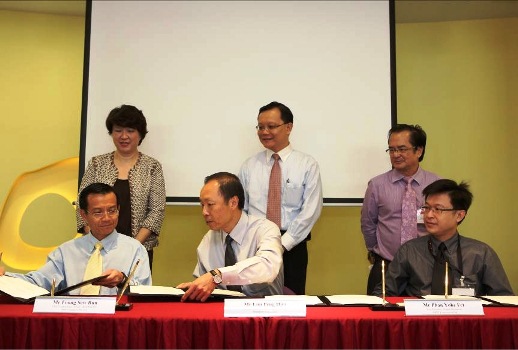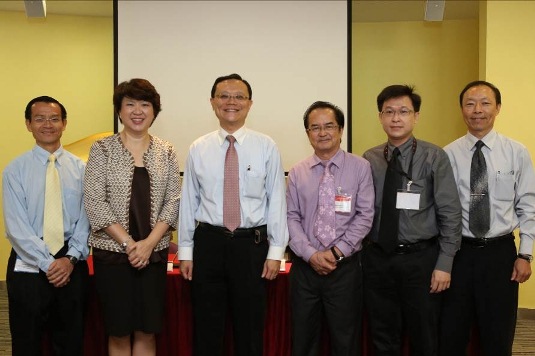Singapore Polytechnic Launches New Diploma with IBM and SMRT to Strengthen Manpower in Service Industries
04 Jan 2013
Published on 04 January 2013
Singapore Polytechnic (SP) is collaborating with
technology giant, IBM, and local transport operator, SMRT to launch a new
engineering diploma.
Known as Diploma in Engineering Systems, this is the
first-of-its-kind engineering course in Singapore. It is a holistic, multi-disciplinary
engineering programme, which combines engineering, management and social
sciences modules, delivered in a studio environment.
It will also include industry-led modules and
materials jointly developed with IBM and SMRT. The new diploma will develop graduates who
can conceptualize, design and integrate engineering processes in large and complex systems related to Energy, Health Care, Logistics, Manufacturing,
Telecommunication and Transportation.
This will produce a well-trained workforce for the future service economy in
Singapore.
Presently, rapid urbanization has resulted in many
infrastructural and economic challenges including traffic congestion, water and
waste management, and food and nutrition security. Hence, there is a strong demand for
specialized manpower to introduce intelligence into processes to meet
these challenges and build a smarter world.
Mr Lim Peng Hun, SP’s Deputy Principal (Technology
& Industry) and Senior Director of Engineering Cluster, said, “The
new diploma is a major milestone for Singapore’s pioneer in Engineering
education. It signifies Singapore
Polytechnic’s forward-looking mindset and philosophy to prepare our students to
be future ready.”
“Our integrated programme will offer students three-year
training to design and build systems in social and economic context, and help
enhance their critical thinking. Our
students will be well-placed in the fast growing engineering services industry
when they graduate. ” added Mr Lim.
Creating manpower for Transportation sector
The growth of public transportation locally and in the
region is projected to be strong.
With the rail network in Singapore expected to double by 2020, including the
extension of existing lines, the two local train operators are projecting
a conservative increase of 1.5 times in demand for specialized
technical urban transportation manpower.
In response to these landscape changes, SMRT has anticipated
the need to increase its pool of technical talents. Since 2009, SMRT Institute has been working
with various government agencies and educational institutions on initiatives to
ensure there are sufficient specialised rapid transit technical talents to
support the long term land transport developments in our country.
One of the initiatives is to develop a diploma-level programme
that can provide a steady and adequate supply of trained technical talents to
support future needs.
“The Diploma in Engineering Systems graduates will have the
option to join the rapid transit industry as they are equipped with the
relevant knowledge and are better prepared for a career in this industry. They will find themselves having an added
advantage in terms of career progression. There are opportunities for career
growth in the organisation, and to further their professional development with
a degree programme, or becoming a professional engineer, among others,” said Mr
Phan Yoke Fei, SMRT’s Vice President, Human Resources and SMRT Institute.
Creating manpower for Engineering Services sector
Similarly, there is an increasing global emphasis on
sustainable development which has heightened the need to develop more efficient
and environmentally sustainable solutions for urban environments and
traditional process industries. These sustainable solutions and process
industries fall under the Engineering Services sector.
As of 2011, the Engineering Services sector accounts for
about 1.2% of Singapore’s GDP and employs 35,000 people. This is expected to
grow 5-6% annually. Hence, there is a
demand for engineers to be trained in engineering design and project
management as well as control automation.
To meet this manpower demand, students studying Diploma in
Engineering Systems can choose to specialize in the Intelligent Systems option at
the end of their second year.
Giving an edge to SP graduates
The diploma is also enhanced with IBM’s Service Science, Management and
Engineering (SSME) programmes. These programmes focus on complex service
systems, such as healthcare, energy grids, and transport networks systems,
which are interconnected and help make cities, and the people who live in them,
smarter.
SSME will be integrated in selected modules within the
Intelligent Systems option as well as various modules during the first two
years of the three-year diploma.
“SSME
programmes focuses on co-value creation with clients to address challenges in
diverse and complex service systems such as transportation, supply chain,
telecommunications, and so on. Its integration into various modules within DES
will enable students to understand engineering systems from a social and
economic view point. As such, DES graduates will be able to develop their
professional career in a wide range of industrial sectors,” said Mr Foong Sew Bun, Chief Technologist and Distinguished
Engineer, IBM ASEAN.
SSME-trained graduates will very
likely enter the workforce as solution designers, consultants, engineers,
scientists, and managers. After gaining practical experience across multiple
industry sectors, they will then go on to be successful entrepreneurs,
executives, researchers, and practitioners, with a solid grounding in theory
and practice to design complex solutions.
In a world of rapid technology,
business, social-organisational, and demand innovation, SSME-trained graduates
will have the knowledge and skills to work
in multi-disciplinary teams on exciting
opportunities and challenges in the future economy.
Course
details
Students of the new diploma will have the opportunity to learn
in specially built engineering design studios instead of the normal
laboratories or workshops. This is a breakthrough in terms of teaching methods
for SP.
These studios allow students more hands-on project work and
interaction where learning will be livelier. Students will get to
apply textbook knowledge to solve simulated real-world problems.
The studio-based learning will prepare students for their
final year capstone project. Working
in teams, students will conduct market research and analysis, develop
engineering prototypes to design a new system/process or improve an
existing system/process for SMRT, IBM or various industry partners.
There will be scholarships available to Diploma in
Engineering Systems students from SMRT and SP.
The first batch of 40 DES students is expected to
graduate in 2016.
Photos from Launch of Diploma in Engineering
Systems

Signing ceremony at launch of Diploma in
Engineering Systems
(Standing from left to right: Ms Janet Ang, Managing Director, IBM Singapore,
Mr Tan Choon Shian, Principal & CEO, Singapore Polytechnic and Mr Khoo Hean
Siang, Executive Vice President, SMRT Trains Ltd)
(Seated from left to right: Mr Foong Sew Bun,
Chief Technologist and Distinguished Engineer, IBM ASEAN, Mr
Lim Peng Hun, SP’s Deputy Principal (Technology & Industry) and Senior
Director of Engineering Cluster and Mr Phan Yoke Fei, SMRT’s Vice President,
Human Resources and SMRT Institute)

Group photo of representatives from Singapore
Polytechnic, IBM and SMRT
For more information:
|
Ms Yvonne Chan
Corporate Communications
Dept
Singapore Polytechnic
T: 6772 1006
M: 9111 7627
E: Yvonne_chan@sp.edu.sg
|
Mr Frank Chua
Corporate Communications
Dept
Singapore Polytechnic
T: 6870 7043
M: 9771 7871
E: frank_chua@sp.edu.sg
|